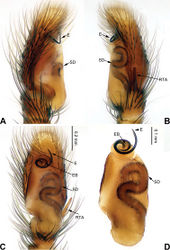Chinophrys mengyangensis
| Notice: | This page is derived from the original publication listed below, whose author(s) should always be credited. Further contributors may edit and improve the content of this page and, consequently, need to be credited as well (see page history). Any assessment of factual correctness requires a careful review of the original article as well as of subsequent contributions.
If you are uncertain whether your planned contribution is correct or not, we suggest that you use the associated discussion page instead of editing the page directly. This page should be cited as follows (rationale):
Citation formats to copy and paste
BibTeX: @article{Cao2016ZooKeys, RIS/ Endnote: TY - JOUR Wikipedia/ Citizendium: <ref name="Cao2016ZooKeys">{{Citation See also the citation download page at the journal. |
Ordo: Araneae
Familia: Salticidae
Genus: Chinophrys
Name
Chinophrys mengyangensis Cao & Li sp. n. – Wikispecies link – ZooBank link – Pensoft Profile
Type
Holotype ♂: CHINA, Yunnan, Jinghong City, Mengyang Town, seasonal rainforest (22°09.765'N, 100°52.553'E, 862 m), 22 July 2012, Q. Zhao & Z. Chen leg. Paratypes: 1♂, same data as holotype; 1♀, CHINA, Yunnan, Mengla County, Menglun Town, 48 km landmark of Nature Reserve (21°38.853'N, 101°09.625'E, 1001 m), seasonal rainforest, 30 July 2012, Q. Zhao & Z. Chen leg.; 1♂1♀, CHINA, Yunnan, Mengla County, Menglun Town, 48 km landmark in Nature Reserve (21°58.704'N, 101°19.748'E, 1088 m), seasonal rainforest, 12 August 2011, Q. Zhao & Z. Chen leg.
Etymology
The species name is derived from the name of type locality; adjective.
Diagnosis
Similar to Chinophrys liujiapingensis (Yang & Tang, 1997) (cf. Yang and Tang 1997[1]: figs 6–10) in having a similar tegulum (Fig. 15D), but the embolus base is much wider. Compared to Chinophrys pengi (Zhang and Maddison 2012[2]: figs 1–9), the tibial apophysis is located retrolaterally vs. dorso-retrolaterally. The epigyne of the new species resembles that of Chinophrys pengi, but the copulatory openings are different (the copulatory openings of the new species have fewer coils than in Chinophrys pengi) (Fig. 16A), and the receptacles lack spherical terminals vs. have spherical terminals in Chinophrys pengi (Fig. 16B).
Description
Male (holotype). Total length 4.80, CL 2.25, CW 1.75, AL 2.55, AW 1.60. Eye measurements: AME 0.48, ALE 0.31, PME 0.05, PLE 0.29, AER 1.62, PER 1.70, EFL 1.44. Clypeus 0.10 high. Legs: I 4.40 (1.45, 0.70, 1.05, 0.70, 0.50); II 3.95 (1.30, 0.65, 0.80, 0.70, 0.50); III 4.60 (1.40, 0.50, 1.00, 1.00, 0.70); IV 4.85 (1.40, 0.60, 1.00, 1.10, 0.75).
Carapace dark brown, tegument iridescent with a few sparse colourless setae (Fig. 16C). Chelicerae, maxillae and labium greyish brown with white tips. Sternum greyish yellow. Abdomen oval and greyish brown. Venter and spinnerets grey. Legs light brown. Spination of leg I: femur d5-1-1; patella p0-1-0; tibia v2-2-2, p1-0-1, r1-0-1; metatarsus v2-0-2, p1-0-1 r1-0-1. Palp: tibia short, about 1/3 the length of the cymbium. Tibial apophysis straight, rod-like and subequal to the length of the tibia (Fig. 15B). Cymbium with long, dark brown bristles. Tegulum twice as long as wide. Seminal duct broad and coiled. Embolus a narrow helix (Fig. 15C).
Female (one of paratypes). Total length 4.73, CL 2.30, CW 2.03, AL 2.43, AW 1.94. Eye measurements: AME 0.60, ALE 0.33, PME 0.03, PLE 0.29, AER 1.79, PER 1.81, EFL 1.44. Clypeus 0.10 high. Legs: I 4.24 (1.39, 0.75, 0.90, 0.75, 0.45); II 4.04 (1.38, 0.70, 0.85, 0.66, 0.45); III 4.93(1.60, 0.80, 0.93, 1.05, 0.55); IV 5.32 (1.56, 0.75, 1.13, 1.25, 0.63).
Abdomen dark brown. Legs grey. Other characters similar to those of male. Epigyne: Copulatory ducts stout, receptacles kidney-shaped, with anteriorly bent translucent ducts (Fig. 16B). Fertilisation ducts located at the anterior part of the receptacles (Fig. 16B).
Distribution
Known from several localities in Xishuangbanna.
Original Description
- Cao, Q; Li, S; Żabka, M; 2016: The jumping spiders from Xishuangbanna, Yunnan, China (Araneae, Salticidae) ZooKeys, (630): 43-104. doi
Images
|
Other References
- ↑ Yang Y, Tang Y (1997) Two new species of the family Salticidae from China (Araneae). Journal of Lanzhou University (Natural Sciences) 33: 93–96.
- ↑ Zhang J, Maddison W (2012) New euophryine jumping spiders from Southeast Asia and Africa (Araneae: Salticidae: Euophryinae). Zootaxa 3581: 53–80.


